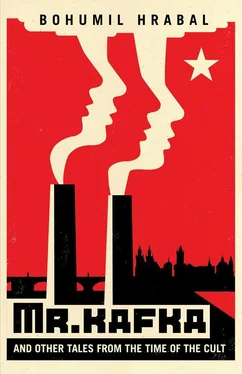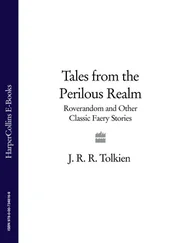Mr. Mit’ánek slipped off his Auxiliary Police armband. In his free time he liked to catch citizens in the act of alighting illegally from streetcars and slap them with fines. “Let me look into it,” he said.
He knocked on the basement door.
By the wall of the Church of the Most Holy Trinity, a stonemason stood on a scaffold, repairing the statue of St. Jude Thaddeus, who had lost a knee and an eye to the ravages of the weather. Further down, the wall of the church was covered with plaques, and a sexton was attempting to pry loose the rusty screws holding them in place.
“Dear Lord Jesus in heaven,” said the sexton. “I’m sick and tired of these cults.”
“It’s paganism,” nodded the stonemason, removing a sandstone knee and eye from his satchel.
“I almost ripped out a fingernail,” the sexton said, shaking his hand.
“Do titles still count for anything in your heaven?” asked the stonemason. He pointed to the plaque the sexton was holding. The inscription read: To Saint Jude Thaddeus, in gratitude for your timely intercession during the storm. Engineer K. H. and Dr. J. “Enamel thank-you notes, and metal missives,” he laughed. “Who actually delivers those things up there?”
“Lord Jesus in heaven,” complained the sexton, “two hundred and ten of these tablets, each with four screws, that makes a total of eight hundred and forty screws, and I’m expected to winkle every one of them out of the wall with my bare hands. I’m sick and tired of these cults!”
“All it needs is a little common sense,” said the stonemason, and he positioned the eye in the graceful sandstone statue.
“But that’s not the end of it,” sighed the sexton. “Once I unscrew all these enamel love letters, I’m going to have to remount them all on the other side of this wall, inside the church — with these freaking flippers,” he said, holding up his delicate little hands. “Another eight hundred and forty screws. Before that, I’ve got to pound eight hundred and forty holes into the wall with a star drill, and then hammer in eight hundred and forty wooden plugs. These walls are like concrete, for heaven’s sake, because didn’t the Church have to build everything to last to the end of bloody time?”
“Come in! I’m the artist’s aunt.”
A bony hand beckoned Mr. Mit’ánek inside.
“I’m an auxiliary policeman,” Mr. Mit’ánek said, bowing his head slightly.
He entered the basement studio. A fire was flickering in the stove. The artist, Mr. Valerián, was mixing plaster of Paris in a trough while the aunt, in a black dress, prodded the fire with an iron poker, then added some finely ground coal from a pile in the corner.
“Can’t stop now! Must keep at it!” Mr. Valerián called out and vomited into the trough.
“I’m glad to hear you say that,” said Mr. Mit’ánek, and he laughed when he saw a mirror with a second Mr. Valerián in it, mixing plaster of Paris.
“Valerián,” said the aunt, “would you like me to heat you up a nice barley sausage?”
“For the love of God, Auntie, I’m creating!” said Mr. Valerián, and he took a swig from a bottle of bitter red wine.
“We are all creators, because we are all one family,” added Mr. Mit’ánek, “but I’m truly impressed.” He stood in front of a life-sized portrait and clasped his hands. “What a splendid work of art! The nation will be thrilled!”
“Won’t it now!” said the aunt, and she lifted the uncooked barley sausage by its little wooden stick. “But just look at the artist. Look how he’s let himself go to seed for the sake of the nation. He never eats a thing, he just drinks, and then there’s the damp. See how wrinkled his feet are?”
“Auntie!” roared Mr. Valerián. “Do not piss me off, for the love of God, do not piss me off… but…” he vomited again into the trough and went on mixing, “… can’t stop now! Must keep at it!”
The sexton, perched on a rickety stepladder, pushed hard on his screwdriver. A truck pulled up beside the church, then turned into the scrap depot in the courtyard. From his platform on the scaffolding, the stonemason watched as the truck dumped hundreds of red enameled panels into a scrap-metal container. In white lettering, each panel displayed the appellation of a square or a street or a park that had once borne the Generalissimo’s name. After the truck left, another truck from the national meat processing works arrived. Onto a pile of scrap paper, it unloaded blood-soaked boxes and wrapping paper with the remnants of tendons, sinews, chunks of flesh, and animal membrane still clinging to them.
As the stonemason held the sandstone eye in place under the statue’s graceful eyelid, he noticed his hand was shaking. He looked around at the high scaffolding enveloping the entire Church of the Most Holy Trinity. It was there so that proletarian hands could restore the building to its former glory.
“It’s not easy being a decent communist these days,” the stonemason said.
“That’s what I like to hear — fighting words,” said Mr. Mit’ánek. “But this is quite the surprise. What’s it supposed to mean?”
“It’s for a competition in honor of Alois Jirásek,” said the aunt, as she put the sausage in a frying pan, “and the subject we’ve chosen is from Jirásek’s Old Czech Legends . It’s Durynk hanging himself from an alder tree because he murdered that little boy. .. But here’s a surprise,” the aunt said, wagging her finger, then tapping a mold that stood on a revolving base. “Inside this is a statue of a Lučan warrior,” she said in a quiet, singsong voice.
“I’ll be a stuffed carp!” said Mr. Mit’ánek, his eyes sparkling. “Is that what you folks have been up to down in this cellar, working to edify the nation?”
Mr. Mit’ánek looked into the eyes of Durynk, who had a noose around his neck, and then he looked over at Mr. Valerián, and saw the same noose hanging from the ceiling above him. He looked at the tunic Mr. Valerián was wearing. “You were your own model for the statue!” Mr. Mit’ánek said, clasping his hands in delight.
Mr. Valerián spat bile into the trough.
“Don’t you think I ought to scramble him an egg?” asked the aunt. “Just look at him, how he prostrates himself on the altar of art. That scrawny little butt of his — like an old lady wringing her hands, like two caraway seeds stuck together.”
“Will you kindly just shut up, Auntie!” wailed Mr. Valerián, and tears ran down his cheeks.
A pair of men’s trousers strode past the window, then someone in a bathing suit, then an entire dog appeared, then some boys ran up, kicked a ball at the wire screen, then flailed away at each other’s legs as they clung to the mesh with their fingers.
Mr. Mit’ánek ran into the street. “Snotty-nosed little buggers!” he shouted. “The Master is down there creating something for the sake of your future and what are you doing? You’re disturbing him, that’s what! I’d love to sic Durynk on you! Or the Lučan warrior!”
But the boys kicked the ball with a thundering blow against the window screen and then volleyed it straight into Mr. Mit’ánek’s face. The auxiliary policeman put his hands over his eyes and groped for the door while the aunt hurried out and led him back down into the studio.
“They’ll end up juvenile delinquents is what they’ll be,” said Mr. Mit’ánek, blowing his nose.
“But what’s to become of Valerián?” asked the aunt. “Just look at what a wreck his art has made of him! He’s shorter by at least four inches. All that creativity has turned him into a hunchback. I know what I’m talking about. I work nights at the National Museum, guarding the stuffed monkeys and apes and those curled up skeletons and all that.”
Читать дальше












